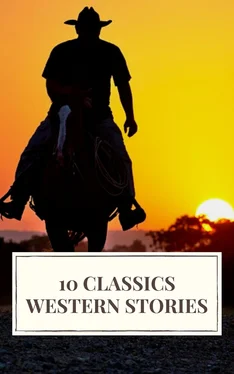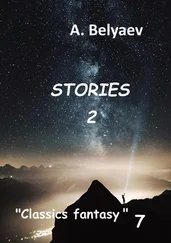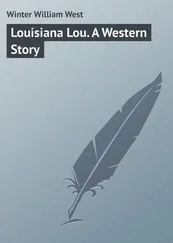Lovely indeed must the mother of Wallulah have been in her life. Withered as her features were, there was a delicate beauty in them still,—in the graceful brow, the regular profile, the exquisitely chiselled chin. Around the shoulders and the small shapely head her hair had grown in rich luxuriant masses.
The chief gazed long on the shrunken yet beautiful face. His iron features grew soft, as none but Wallulah had ever seen them grow. He touched gently the hair of his dead wife, and put it back from her brow with a wistful, caressing tenderness. He had never understood her; she had always been a mystery to him; the harsh savagery of his nature had never been able to enter into or comprehend the refined grace of hers; but he had loved her with all the fierce, tenacious, secretive power of his being, a power that neither time nor death could change. Now he spoke to her, his low tones sounding weird in that house of the dead,—a strange place for words of love.
“My woman,—mine yet, for death itself cannot take from Multnomah that which is his own; my bird that came from the sea and made its nest for a little while in the heart of Multnomah and then flew away and left it empty,—I have been hungry to see you, to touch your hair and look upon your face again. Now I am here, and it is sweet to be with you, but the heart of Multnomah listens to hear you speak.”
He still went on stroking her hair softly, reverently. It seemed the only caress of which he was capable, but it had in it a stern and mournful tenderness.
“Speak to me! The dead talk to the tomanowos men and the dreamers. You are mine; talk to me; I am in need. The shadow of something terrible to come is over the Willamette. The smoking mountains are angry; the dreamers see only bad signs; there are black things before Multnomah, and he cannot see what they are. Tell me,—the dead are wise and know that which comes,—what is this unknown evil which threatens me and mine?”
He looked down at her with intense craving, intense desire, as if his imperious will could reanimate that silent clay and force to the mute lips the words he so desired. But the still lips moved not, and the face lay cold under his burning and commanding gaze. The chief leaned closer over her; he called her name aloud,—something that the Willamette Indians rarely did, for they believed that if the names of the dead were spoken, even in conversation, it would bring them back; so they alluded to their lost ones only indirectly, and always reluctantly and with fear.
“Come back!” said he, repeating the name he had not spoken for six years. “You are my own, you are my woman. Hear me, speak to me, you whom I love; you who, living or dead, are still the wife of Multnomah.”
No expression flitted over the changeless calm of the face beneath him: no sound came back to his straining ears except the low intermittent roar of the far-off volcano.
A sorrowful look crossed his face. As has been said, there was an indefinable something always between them, which perhaps must ever be between those of diverse race. It had been the one mystery that puzzled him while she was living, and it seemed to glide, viewless yet impenetrable, between them now. He rose to his feet.
“It comes between us again,” he thought, looking down at her mournfully. “It pushed me back when she was living, and made me feel that I stood outside her heart even while my arms were around her. It comes between us now and will not let her speak. If it was only something I could see and grapple with!”
And the fierce warrior felt his blood kindle within him, that not only death but something still more mysterious and incomprehensible should separate him from the one he loved. He turned sadly away and passed on to the interior of the hut. As he gazed on the crumbling relics of humanity around him, the wonted look of command came back to his brow. These should obey; by iron strength of will and mystic charm he would sway them to his bidding. The withered lips of death, or spirit voices, should tell him what he wished to know. Abjectly superstitious as was the idea it involved, there was yet something grand in his savage despotic grasp after power that, dominating all he knew of earth, sought to bend to his will even the spirit-land.
The chief believed that the departed could talk to him if they would; for did they not talk to the medicine men and the dreamers? If so, why not to him, the great chief, the master of all the tribes of the Wauna?
He knelt down, and began to sway his body back and forth after the manner of the Nootka shamans , and to chant a long, low, monotonous song, in which the names of the dead who lay there were repeated over and over again.
“Kamyah, Tlesco, Che-aqah, come back! come back and tell me the secret, the black secret, the death secret, the woe that is to come. Winelah, Sic-mish, Tlaquatin, the land is dark with signs and omens; the hearts of men are heavy with dread; the dreamers say that the end is come for Multnomah and his race. Is it true? Come and tell me. I wait, I listen, I speak your names; come back, come back!”
Tohomish himself would not have dared to repeat those names in the charnel hut, lest those whom he invoked should spring upon him and tear him to pieces. No more potent or more perilous charm was known to the Indians.
Ever as Multnomah chanted, the sullen roar of the volcano came like an undertone and filled the pauses of the wild incantation. And as he went on, it seemed to the chief that the air grew thick with ghostly presences. There was a sense of breathing life all around him. He felt that others, many others, were with him; yet he saw nothing. When he paused for some voice, some whisper of reply, this sense of hyper-physical perception became so acute that he could almost see , almost hear , in the thick blackness and the silence; yet no answer came.
Again he resumed his mystic incantation, putting all the force of his nature into the effort, until it seemed that even those shadowy things of the night must yield to his blended entreaty and command. But there came no response. Thick and thronging the viewless presences seemed to gather, to look, and to listen; but no reply came to his ears, and no sight met his eyes save the swathed corpses and the white-gleaming bones on which the shifting moonbeams fell.
Multnomah rose to his feet, baffled, thwarted, all his soul glowing with anger that he should be so scorned.
“Why is this?” said his stern voice in the silence. “You come, but you give no reply; you look, you listen, but you make no sound. Answer me, you who know the future; tell me this secret!”
Still no response. Yet the air seemed full of dense, magnetic life, of muffled heart-beats, of voiceless, unresponsive, uncommunicative forms that he could almost touch.
For perhaps the first time in his life the war-chief found himself set at naught. His form grew erect; his eyes gleamed with the terrible wrath which the tribes dreaded as they dreaded the wrath of the Great Spirit.
“Do you mock Multnomah? Am I not war-chief of the Willamettes? Though you dwell in shadow and your bodies are dust, you are Willamettes, and I am still your chief. Give up your secret! If the Great Spirit has sealed your lips so that you cannot speak, give me a sign that will tell me. Answer by word or sign; I say it,—I, Multnomah, your chief and master.”
Silence again. The roar of the volcano had ceased; and an ominous stillness brooded over Nature, as if all things held their breath, anticipating some mighty and imminent catastrophe. Multnomah’s hands were clinched, and his strong face had on it now a fierceness of command that no eye had ever seen before. His indomitable will reached out to lay hold of those unseen presences and compel them to reply.
Читать дальше












